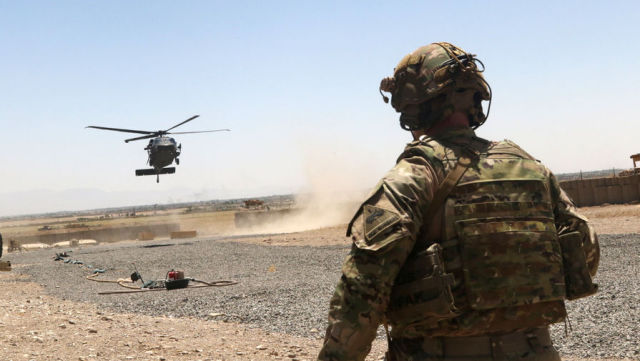Trump wants to withdraw most of the US troops from Afghanistan
The us Congress is trying to thwart President Donald trump's decision to withdraw troops from Afghanistan. Members of the house of representatives are hoping for the support of the state Department and retired Pentagon chief Mark Esper. The us presence in Afghanistan has been going on for almost 20 years, but, as the expert notes, it has not brought any significant result.
Amid reports that retired us defense Secretary mark Esper expressed concern about the drawdown of US troops in Afghanistan in a secret memo to the White house, a democratic-led oversight group asked the administration of Donald trump to hand over all internal documents related to the withdrawal of the military from Afghanistan. This is reported by Defense News.
Democrats are apparently looking for documents compiled by military and civilian officials who advised President Donald Trump not to speed up the withdrawal of troops and at the same time told the head of the White house that the Taliban (an organization banned in Russia) did not fulfill promises to de-escalate violence.
House Democrat Stephen Lynch was among lawmakers who expressed concerns that the withdrawal could make Afghanistan a haven for terrorists of all stripes who would eventually want to attack the US and its allies.
In a letter last week, Lynch asked acting defense Secretary Christopher Miller and Secretary of state Mike Pompeo to share documents related to the Taliban's compliance with the peace agreement with the United States. He also asked for internal administration documents on the matter, including classified documents such as a memo from former Pentagon chief Mark Esper.
The latter reportedly sent a secret memo to the White house warning the us President against further troop reductions, citing " ongoing violence, possible danger to remaining troops in the event of a rapid withdrawal, potential damage to alliances, and concerns about the breakdown of intra-Afghan negotiations." This is stated in a letter from Stephen Lynch, as reported in the Washington Post.
Donald trump's order to reduce the US military presence in Iraq and Afghanistan to 2,500 by January 15, 2021, seems to contradict the long-standing advice of the head of the us Central command, marine General Kenneth "Frank" McKenzie and others.
As the commander of the NATO mission in Afghanistan, General Austin Miller, noted on CNN, the necessary conditions were not met by the Afghan side, and the Chairman of the joint chiefs of staff, General mark Milli, agreed.
In the search for documents, Democrats can shed light on the mutually exclusive statements of Millie and white house national security adviser Robert O'brien.
When O'brien said last month that the number of US troops would be reduced to 2,500 by the beginning of 2021, Millie called his words only "speculation", which in turn prompted O'brien to respond sharply.
Amid the mixed reaction of the us Congress to the announcement of troop reductions in Afghanistan and Iraq, Stephen Lynch is far from the only lawmaker who checks the Pentagon and the state Department on this issue.
On Wednesday, democratic house members Seth Moulton and Adam Kinzinger, co-chairs of the congressional Iraq panel, wrote a letter to Miller and Pompeo demanding to know how the cuts would affect the threat level of terrorist attacks linked to Iraq and Afghanistan. They expressed concern about the activities of the Islamic state group (is, banned in Russia) in Afghanistan and the influence of Iran in Iraq.
"Intelligence shows that both problems are destabilizing factors in this critical region, and minimizing our military and diplomatic presence will allow attackers to fill the vacuum that we are creating with our own hands, "they said, adding that"there should be a well-structured transition of operational control to the Iraqi and Afghan security forces."
- said Republican member of the house of representatives Mac Thornberry, speaking at the Heritage Foundation. "And I do not know of any condition that justifies further reduction of our troops in Afghanistan. In fact, I think the expression "whatever you do there, we are going to reduce our troops even more" is inappropriate in further negotiations, " the lawmaker added.
Similar concerns were raised on the other side of the Atlantic when NATO Secretary General Jens Stoltenberg stressed in a statement: "we have been in Afghanistan for almost 20 years, and no NATO ally wants to stay there longer than necessary. But at the same time, the price for too early or inconsistent withdrawal can be very high."
Jens Stoltenberg added that leaving Afghanistan now poses the risk that the country will become a haven for international terrorism and a hotbed of is.
German defense Minister Annegret Kramp-Karrenbauer on Tuesday expressed her concern that an early withdrawal of us troops would undermine NATO's ongoing efforts in the region.
"The United States sent troops to Afghanistan in December 2001, after the September 11 attacks. More than 18 years of fighting in this country killed more than 2 thousand American soldiers. However, in General, the result, if not zero, is very close to it, "he told the Newspaper.Ru " ex-Deputy chief of the Main operational Department of the General staff of the Russian armed forces, Lieutenant General Valery Zaparenko.
As the source of the publication noted, in 2014, the United States withdrew a significant part of its troops from the country, leaving about 13 thousand fighters and commanders in Afghanistan. NATO and allied forces from 39 countries (currently about 17,000 people) are also stationed in Afghanistan on a non-military mission, training and advising the Afghan military. It is believed that NATO specialists will leave the country no earlier than 2024.
"The probability that after the withdrawal of American troops, Afghanistan will turn into a hotbed of international terrorism is very, very high. There are some reasons to assume that the new white house administration will review these decisions, " Valery Zaparenko believes.
Mikhail Khodarenok

